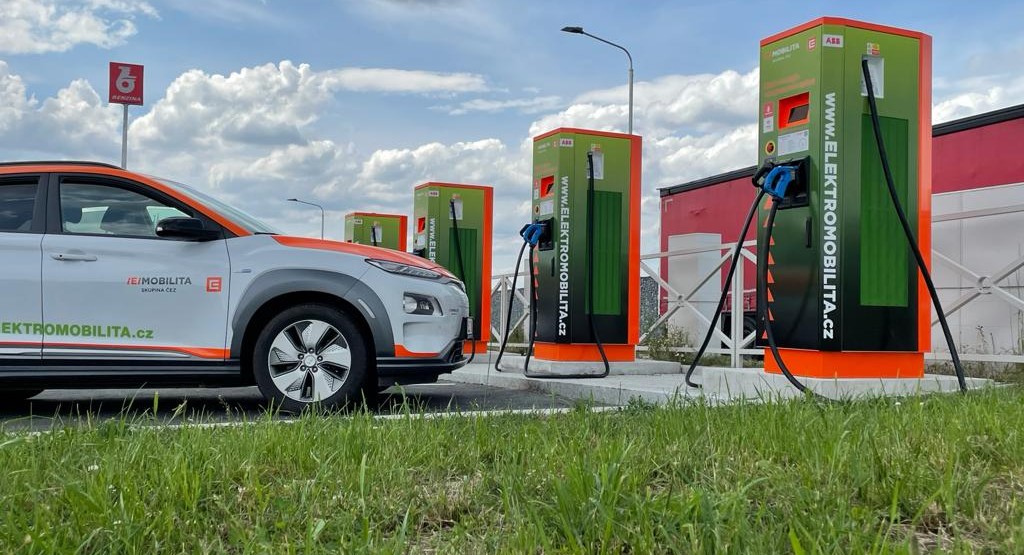LEADERS OF E-MOBILITY IN THE CZECH REPUBLIC HAVE ESTABLISHED THE ELECTROMOBILITY PLATFORM
Electromobility is developing rapidly, and it is necessary to actively grasp all the opportunities it offers. The growing need for conceptual development in this area has led major industry players to establish the Electromobile Platform. The founding members are ČEZ, ŠKODA AUTO, PRE, E.ON, and the academic sector is represented by ČVUT.

Electric vehicles are on the rise, charging infrastructure is expanding, and tools are emerging to support it.
There are already more than 15,000 electrified vehicles on national roads, using more than 1,800 public charging points. Like any new industry, electromobility is facing a number of obstacles and challenges. “Electromobility is developing chaotically, but has to overcome a number of challenges to develop properly. Therefore, we consider it necessary to join forces in many ways and to jointly contribute to creating an environment for its further development,” explains Pavel Čmelík, Chairman of the Steering Committee representing ČEZ.
The founding members of the Electromobility Platform are entities from the automotive, energy and academic sectors. The automotive sector is represented by ŠKODA AUTO, the largest domestic car manufacturer, represented by Michal Kadera. From the energy sector, the members of the platform are the major players in the field of charging infrastructure development: the companies ČEZ (represented by Pavel Čmelík), PRE (Karsten Krämer), and E.ON (Jana Hrabětová). The academic field is represented by the ČVUT with Pavel Hrubeš.
Europe has clearly stated its ambition to achieve carbon neutrality by 2050 in the adopted “Europe Green Deal” strategy. Decarbonisation of the transport sector is one of the contributions to achieving this goal and brings many opportunities for society as a whole. There is huge potential for electromobility to improve the quality of life in city centres, but also for companies that jump on the electromobility bandwagon early.
The Electromobility Platform will be involved in the development of strategies and legislative measures in the field of climate protection and electromobility and in the implementation of government strategies such as the National Action Plan Clean Mobility or the Memorandum on the Future of the Czech Automotive Industry. It will provide input from practice and engage with key institutions. “Together with the Czech government, we need to set up a motivating eco-system to support electromobility for companies and citizens using tax and subsidy instruments,” explains Michal Kadera, Vice-Chairman of the Steering Committee.
The Electromobility Platform has defined “5 POINTS FOR ELECTROMOBILITY” that need to be addressed and further developed:
1) Charging infrastructure – using national and EU funds, simplifying and accelerating the construction of charging stations, supporting measures that enable users to charge cheaply and without disruption at public stations, at home or at work.
2) Availability of vehicles – for the public and the business community, with the support of national and European funding mechanisms.
3) Innovation and education – supporting the development of science, research and education, raising public awareness, supporting new skills that enable the transformation of industrial sectors, especially automotive and energy.
4) Electromobility ecosystem – development and updating of strategies, legislation and technical standards.
5) Cooperation – supporting national and international cooperation and exchange of experience, cooperation with the government, representatives of regions and municipalities, supporting the development of related innovative sectors and services.
“Electromobility is a new and fast-growing sector. Therefore, within the platform, we want to focus on simplifying and harmonising the regulatory framework and authorisation processes for the construction of public chargers. Last but not least, there is one topic that I consider very important. It is the harmonisation of the conditions for reserving parking spaces at charging stations,” adds Steering Committee member Karsten Krämer.
“We need to refine and clearly specify the conditions for installing charging infrastructure in garages of residential and commercial buildings, amend the law on fuel and many other things,” continues Steering Committee member Jana Hrabětová. Cooperation with universities and the science and research sector will also be crucial. “Czech technical universities possess immense know-how that they are ready to share and support new solutions in the field of electromobility,” concludes Steering Committee member Pavel Hrubeš.
The secretary of the platform is Lukáš Folbrecht, tajemnik@ePlatforma.cz
More information at www.ePlatforma.cz
- ČEZ built a record 110 electric vehicle stations last year
- CEZ is involved in the construction of one of the world’s largest particle accelerators
- ČEZ seeks to promote greater diversity in its work teams, adopting a new diversity and inclusion policy
- INVEN CAPITAL has successfully sold its stake in the Israeli start-up Driivz, increasing the value of the original investment many times over in three years